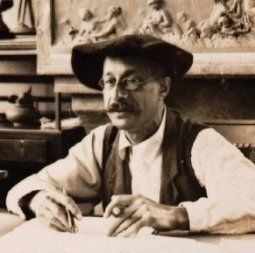Andre Gedalge
Andre Gedalge was born on 27 December 1856 in Paris (France). He learned the piano from an early age, but after school he followed the wish of his parents and became a bookseller in the "Librairie Gedalge jeune", the business of his father. But in 1884 Andre Gedalge decided to quit his work as a bookseller and instead study music. He enrolled at the Paris conservatory and studied under Ernest Guiraud. Already in 1885 Andre Gedalge received an honorable mention in the Prix de Rome and the Deuxieme Second Prix de Rome for his cantata "La Vision de Saul" just a year later in 1886.
After his studies he works as a repetiteur in the classes of Guiraud and later Jules Massenet at the Paris conservatory. As a composer Andre Gedalge first created several operas bouffes which were performed at the Opera-Comique or the Theatre des Nouveautes. But other genres followed shortly: The first symphony dates from 1893, the Violin sonata from 1897 and the piano concerto from 1899.
In the 1904 Andre Gedalge was appointed supervisor of the musical education and in 1905 professor at the Paris conservatory. At the conservatory Andre Gedalge lectured counterpoint and fugue and his teaching became exceedingly influential on many of his students like Maurice Ravel, Georges Enesco, Darius Milhaud or Arthur Honegger. Already in 1904 Andre Gedalge published an instructional book on the fugue (Traite de la fugue) which became a standard.
Through his work as an instructor Andre Gedalge also noticed the weakness of the musical education of younger students in the countryside and developed a new method based on hearing music. He published his ideas in 1921 under the title "The Instruction of Music by the Education of the Ear".
Andre Gedalge died on 5 February 1926 in Chessy (France).
The work catalogue of Andre Gedalge contains 3 symphonies, a piano concerto, a violin concerto, 2 violin sonatas, a string quartet, a few more chamber works, piano music, songs and music for choir as well as the award winning cantata "La Vision de Saul". He also composed several stage works like the opera-bouffe "Pris au piege", the opera-comique "Le Rabbin", the ballet "Phoebe" or the pantomime "Le Petit Savoyard".
Rondeau d'Oreste, for soprano and orchestra
In my possession is the autograph manuscript of the "Rondeau d'Oreste" for soprano and orchestra by Andre Gedalge. The work is unpublished so far and most likely unknown in the work catalogue of Andre Gedalge. The manuscript is not dated but the title page gives the following complete title "Volapück Revue / Rondo d'Oreste". The reference to the "Volapück-Revue" allows to present some more information about the history of the work:
The Volapük-Revue (this spelling is much more common and the official writing) was a show at the Theatre des Menus-Plaisirs in Paris and was written by William Busnach and Albert Vanloo. The two playwrights wrote several plays before that date that were set to music by Offenbach, Litolff, Chabrier or Alexandre Lecocq. In 1886 the two worked together for the first time and created the Volapük-Revue.
The revue premiered on 11 December 1886 at the Theatre des Menus-Plaisirs with a remarkable star: Paulus (i.e. Jean-Paulin Habans), one of the most popular French singers at that time.
The show consisted of 9 pictures with different small "stories". A newspaper review gave an overview about the settings:
"Citons, parmi les tableaux les mieux reussis: l'Hotel des Postes, la Fete des Fleurs, les doleances d'Homere et de Virgile, expulses l'un et l'autre de l'Universite; la scie des pastilles Geraudel, le tableau des Porcherons; la nuit de noces incroyable traversee par le passage de trains du Metropolitain; le duo des jeuneurs Succi et Merlatti dansant ensuite la tarantelle, le Concert tunisien et l'exibition d'une belle Fatma des Batignolles; le tableau patriotiquee du Cours de Vincennes, et enfin l'acte des theatres renfermant des imitations fort reussis."
The title-giving picture is when Homer and Virgil sit together, both expelled from university and replaced by professors for Volapük, and lament their situation.
The show received favourable reviews but curiously never mentioned the composer of the music. But it seems that Andre Gedalge composed the complete music for this show. The France National Library holds two similar autograph manuscripts by Andre Gedalge marked "Volapük-Revue" that contain the songs "Chanson de Fatma" and "Chanson de la Cantiniere". The location of the other music of the show is unknown.
The "Rondeau d'Oreste" was performed and premiered by Clara Lardinois in the Volapük-Revue. Clara Lardinois was a Belgian soprano who later became better known under her stage name "Blanche Arral".
The full score of the "Rondeau d'Oreste" can be downloaded here:
